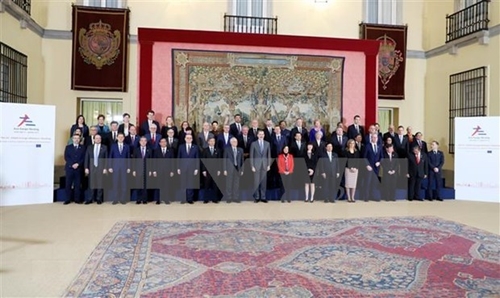In a statement released on September 7, they recognized that combating the COVID-19 pandemic will require concerted international cooperation, effective actions by multilateral organizations, and support for multilateralism by ASEM partners, based on U.N. principles and values.
The partners reaffirmed their commitment to working together and sharing experiences, best practices and information in a free, responsible, transparent and timely manner in order to decisively and effectively control the spread of the pandemic.
    |
 |
|
Participants at the 14th ASEM Foreign Ministers' Meeting in Madrid, Spain, on December 15-16, 2019 |
They supported the United Nations’ call for shared responsibility, global solidarity and strengthened multilateral cooperation in response to the multidimensional impacts of COVID-19, especially the importance of the World Health Organization (WHO) in coordinating the health response to the pandemic.
“We reaffirm our commitment to maintain the momentum of ASEM to strengthen multilateralism for socio-economic resilience. The virus will not weaken our resolve to stand together in solidarity and our mutual support during this difficult time,” read the statement.
The ASEM statement on COVID-19 was compiled with coordination of the Foreign Ministers of Cambodia as host nation of the 13th ASEM Summit, the EU and Germany as regional coordinators of the European group, Singapore as the regional coordinator of the ASEAN group, and Russia as the regional coordinator of the Northeast and South Asia group.
Due to the complicated developments of the COVID-19 pandemic, the 13th ASEM Summit, which is slated for November 16-17 in Phnom Penh, Cambodia, has been postponed to mid-2021.
ASEM was established in 1996 as a dialogue and cooperation forum between Europe and Asia. It comprises 27 EU member countries, Norway, Switzerland, and 10 ASEAN member countries, along with China, Russia, Japan, Australia.
ASEM partners make up 65 percent of the global economy, 60 percent of the world population, 55 percent of the world trade, and 75 percent of the global tourism revenue.
Source: VNA